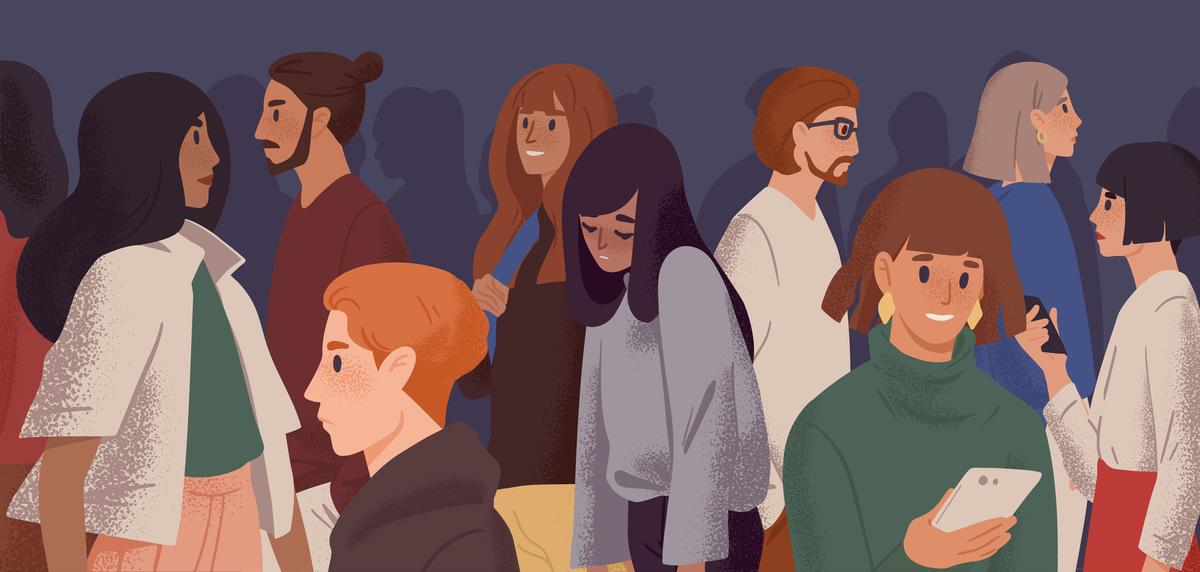From Heartache to Healing: Navigating Loneliness in Your Post-Breakup Journey
"Loneliness and the feeling of being unwanted is the most terrible poverty." - Mother Teresa. Loneliness is an inevitable part of the human experience, and it can become particularly poignant after a breakup. When a romantic relationship ends, the loss of companionship and emotional support can leave you isolated and disconnected. This article explores loneliness after a breakup, shedding light on its impact, the emotional rollercoaster it entails, coping strategies, finding strength and growth, and ultimately, moving forward to build a fulfilling life.
What is Loneliness?
Loneliness is a complex emotional state characterized by isolation, disconnection, and the absence of meaningful social relationships. It can have profound effects on our mental and physical well-being, leading to:
- Depression
- Increased stress
- Anxiety
- Drug abuse risk
- Heart issues
- Weight pain
- Insomnia
After a breakup, loneliness can be intensified due to the loss of a romantic partner who was once a primary source of companionship and emotional support. The sudden absence of shared experiences, and intimate connections, and the disruption of daily routines can trigger profound feelings of loneliness.
The Emotional Rollercoaster: Post-Breakup Loneliness
The post-breakup period is often accompanied by a wide range of emotions. Grief, sadness, anger, confusion, and self-doubt are common, and the intensity of these emotions can vary from person to person. Loneliness plays a unique role during this time, amplifying these emotions and creating a sense of emptiness and longing.
Loneliness in the aftermath of a breakup differs from general loneliness because it is intertwined with the loss of a specific relationship. Memories, reminders, and the absence of a familiar presence can trigger waves of loneliness. It can also be exacerbated by the societal expectation that individuals should be over the breakup quickly, leading to feelings of isolation and further intensifying the loneliness experienced.
Sarah's Journey Through Post-Breakup Loneliness
Sarah had been in a committed relationship with Alex for four years when they decided to part ways. The breakup left Sarah feeling lost, confused and engulfed in a profound sense of loneliness. As she navigated through the emotional turmoil, Sarah experienced a range of emotions.
In the immediate aftermath of the breakup, Sarah felt a deep sense of grief and sadness. She found herself replaying happy memories and wondering what went wrong. The absence of Alex's presence in her daily life was a constant reminder of the void she now felt.
As the days turned into weeks, anger started to surface within Sarah. She questioned why Alex had left and why she had invested so much time and love into a relationship that had ultimately ended. Angry thoughts and resentful emotions consumed her, intensifying her feelings of loneliness.
Amidst the sadness and anger, Sarah also experienced moments of self-doubt. She wondered if she was to blame for the breakup and whether she was unworthy of love. This self-doubt further deepened her sense of loneliness, as she began to question her value and desirability.
However, as time passed, Sarah realized that she had a choice. She could allow herself to be defined by her loneliness and let it consume her, or she could use it as a catalyst for personal growth and healing. She decided to embark on a journey of self-discovery and self-care.
Sarah sought solace in her loved ones, sharing her experiences and emotions with trusted friends and family. Their support and understanding became a lifeline during her moments of loneliness. She also engaged in activities that brought her joy, such as painting and exploring new hobbies, which helped distract her from the overwhelming sense of emptiness.
Through counseling, Sarah learned to process her emotions and develop healthy coping mechanisms. She gained insights into her patterns and behaviors, paving the way for personal growth and self-improvement. Gradually, Sarah started to redefine herself outside of the relationship and discovered her strengths and passions.
As Sarah journeyed through post-breakup loneliness, she realized that it was not a linear process. There were good days and bad days, moments of strength and moments of vulnerability. However, each step she took toward healing brought her closer to finding inner peace and embracing a future filled with hope and fulfillment.
Coping Strategies for Post-Breakup Loneliness
Coping with post-breakup loneliness requires a multifaceted approach. Here are several coping mechanisms that can help you navigate your way through this challenging time:
- Engaging in self-care activities: It is crucial to care of yourself physically, mentally, and emotionally. Regular exercise, proper nutrition, and adequate sleep contribute to overall well-being and can alleviate some of the emotional distress caused by loneliness.
- Seeking support from friends and family: Building a support network of trusted friends and family members can provide much-needed companionship and understanding during times of loneliness. Sharing feelings and experiences with loved ones can offer a sense of connection and comfort.
- Engaging in hobbies or new activities: Exploring personal interests, pursuing hobbies, and trying new activities can provide a sense of purpose and fulfillment. Engaging in enjoyable and meaningful activities can distract from loneliness and foster personal growth.
- Exploring counseling or therapy options: Professional help can be invaluable in navigating post-breakup loneliness. Therapists or counselors can provide a safe and supportive space to process emotions, gain insights, and develop healthy coping strategies.
Remember that coping strategies are not one-size-fits-all solutions. It is unique to individuals, and what works for one person may not work for another. Hence, it is essential to experiment with different approaches and find what resonates best with your own needs and preferences.
Finding Strength and Growth Through Loneliness
Loneliness after a breakup can also provide an opportunity for self-discovery and personal growth. It offers a chance to delve deeper into understanding yourself, reflect on past experiences, and redefine personal goals and priorities.
During this period, you often develop a stronger sense of self, gain clarity about your values and desires, and build resilience. Loneliness can be a catalyst for personal growth, leading to increased self-confidence, independence, and a greater capacity for empathy and compassion toward others.
Moving Forward: Building a Fulfilling Life
Moving forward after experiencing post-breakup loneliness is a gradual process that requires patience, self-compassion, and active effort. Here are some tips and suggestions to help you build a fulfilling life:
Set realistic expectations for healing
It's essential to acknowledge that healing takes time and there will be ups and downs during this process. Set realistic expectations and be gentle with yourself as you navigate the healing process.
Focus on personal growth and self-improvement
Engaging in activities that foster personal growth, such as pursuing education, setting new goals, or developing new skills, can provide a sense of purpose and fulfillment. Channeling energy into self-improvement helps build resilience and cultivates a positive outlook on life.
Cultivate new relationships and social connections
Actively seeking new friendships and social connections can help combat feelings of loneliness. Engaging in social activities, joining clubs or organizations, or participating in community events provides opportunities to meet like-minded people and expand social networks.
Embrace solitude and find joy in your own company
Learning to enjoy solitude and appreciate your company is an empowering aspect of moving forward. Engaging in activities that promote self-reflection, such as journaling, meditation, or creative pursuits, can deepen self-awareness and foster a sense of inner peace and contentment.
It is important to view post-breakup loneliness as an opportunity for personal development and growth. Embracing the journey and being open to new experiences and perspectives can lead to a fulfilling and meaningful life beyond the breakup.
Conclusion
Loneliness after a breakup is a challenging and often painful experience. However, acknowledging the emotional rollercoaster, implementing coping strategies, finding strength and growth, and actively moving forward can help you navigate your way to a fulfilling life. Embracing loneliness can serve as an opportunity for self-discovery and personal development to emerge stronger, wiser, and more resilient on the other side of a breakup. Remember, you are not alone. There is hope for a brighter future beyond loneliness.
By: Damilola Elewa
Category: Mental Health
Also, Read:









Comments (0)